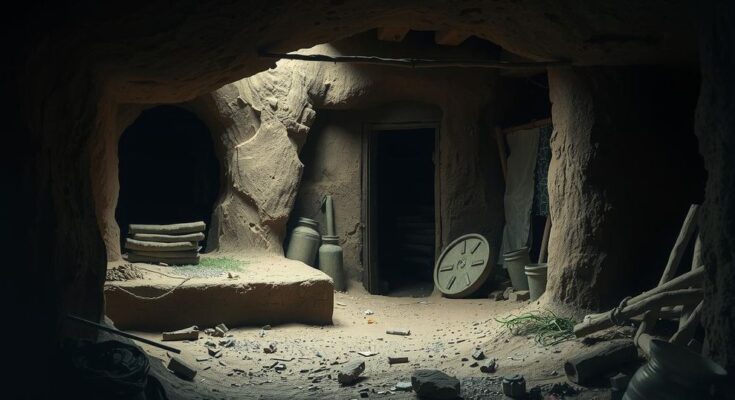The article highlights the dire conditions in besieged El-Fasher, Sudan, where residents like Nafisa Malik seek shelter from ongoing military conflict. As the RSF escalates attacks, makeshift bunkers are constructed for protection. The situation has led to significant humanitarian crises including famine, while access to aid is increasingly obstructed. Experts warn that the loss of control over El-Fasher could shift the balance of power in the conflict.
In the besieged Sudanese city of El-Fasher, Nafisa Malik, a 45-year-old mother of five, holds her children close in a cramped underground refuge as artillery shells explode nearby. She described their harrowing experience by stating, “Time slows down here. We sit in the darkness, listening, trying to guess when it’s over,” illustrating the gravity of the situation and the constant fear gripping the residents.
The ongoing conflict, which has persisted for nearly two years between the paramilitary Rapid Support Forces (RSF) and the Sudanese Army, has resulted in the deaths of tens of thousands of individuals. United Nations Secretary-General Antonio Guterres characterized the crisis as a “crisis of staggering scale and brutality,” emphasizing the humanitarian toll of the warfare. Recently, clashes in El-Obeid turned deadly, with shelling leading to casualties, indicating an escalation of violence.
El-Fasher remains the last major city in Darfur under Army control, making it a critical stronghold as the RSF continues efforts to capture it. Residents have constructed makeshift bunkers for protection against persistent attacks, with varying designs from simple foxholes to reinforced shelters. Mohammed Ibrahim, highlighting the need for stronger protection, underscored this necessity when his initial belief in hiding under beds proved inadequate.
Research from Yale University’s Humanitarian Research Lab revealed extensive structural damage throughout El-Fasher, correlating with bombardments from both the Army and RSF. Notably, the Saudi Hospital has adapted its operations by creating an underground shelter that serves as an operating room during strikes, further illustrating the dire medical crisis facing the city.
Historically, El-Fasher has been pivotal in the region, and its retention by the Army is crucial in preventing total RSF dominance, as the group seeks control over valuable gold resources. The African Union raised alarms about potential partitioning in Sudan, confirming that El-Fasher is fortified against RSF capture. Marc Lavergne, an expert on Sudan, mentioned the Army’s entrenched position while the Zaghawa community, under threat from the RSF, has joined the defense of the city due to existential fears.
The ongoing standoff poses a significant dilemma for the Army and its allies regarding resource allocation while facing mounting civilian costs. Reports regarding famine in displacement camps have emerged alongside warnings from humanitarian organizations about impending dire consequences if aid continues to be obstructed by the RSF. Shop owner Ahmed Suleiman noted the impossibility of procuring goods under such conditions, highlighting the increased costs due to corruption at checkpoints. Leni Kinzli from the World Food Programme echoed these concerns, warning that a lack of aid could lead to catastrophic outcomes for the beleaguered population.
In summary, the ongoing conflict in Sudan’s Darfur region, particularly in El-Fasher, presents a dire humanitarian crisis marked by violence and profound displacement. As the RSF tightens its grip and the Army fights to maintain control, civilians are caught in a precarious situation, with access to food and shelter severely compromised. The international community must recognize the stakes involved as deteriorating conditions beckon immediate intervention to alleviate the suffering of the affected populations.
Original Source: www.thehindu.com




